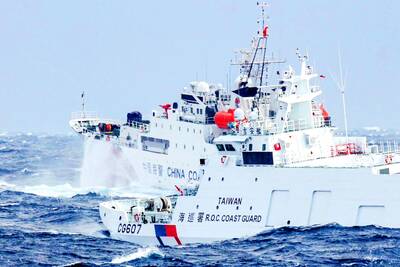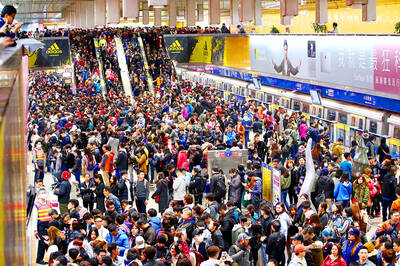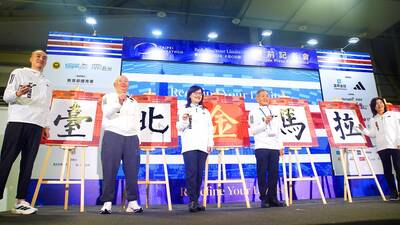“Happy farmers raise happy chickens” is the philosophy that has guided one Miaoli farm throughout its arduous transformation to become the largest humane egg producer in the nation.
Five years ago, Lin Chih-chieh (林智傑), a second-generation farmer decided to transform his family’s business in Miaoli County into a humane egg farm.
He has not looked back since, even after racking up losses into the tens of millions of New Taiwan dollars over the first three years of his endeavor.

Photo provided by the Mao-Lin Animal Welfare Poultry Farm via CNA
Now Lin produces 14 million eggs per year from free-roaming chickens supported by the latest technologies — a far cry from the caged farming typical of Taiwan’s egg industry.
Before going to live in Australia for more than a decade, Lin helped his father on their family chicken farm, raising poultry for consumption.
However, meat farms and egg farms operate differently, Lin said.

Photo courtesy of the Mao-Lin Animal Welfare Poultry Farm
Chickens raised for meat “are placed on the ground where they can eat, walk around, rest, drink water and sometimes run around a bit,” he said. “They are not as unruly as egg-laying hens.”
Since the chickens’ lifespans were relatively short, Lin said that his sister — who helps run the farm — found it difficult to bear.
“Every time a chicken’s time had come, she would lock herself in her room and refuse to come out,” he said.
Because of this, Lin said that he had the idea of turning away from the butcher industry and transforming the business into a free-range egg farm.
In his initial research, Lin found that about 90 percent of egg producers in Taiwan keep caged hens, most of which are Hy-Line white varieties bred to be efficient egg-layers without needing much space or food.
“These white varieties are actually less docile and more active” than other types of chickens, he said. “But sadly, because they are small in stature, it is easy to keep them in cages.”
Livestock have always been treated this way, maximizing production through technology, “but we cannot forget the contributions animals make to humans,” he said.
Lin reimagined his business, the newly named Mao-Lin Animal Welfare Poultry Farm, under the philosophy “happy farmers raise happy chickens.”
Instead of the spirited white varieties, Lin chose to raise a type of red chicken that is more docile.
The hens are allowed to roam freely inside huge enclosed barns equipped with raised platforms, areas to grind down their nails, egg-laying enclosures and any other facility that a chicken might want.
In consideration of their natural habits, the barn floor also has a layer of bedding for sand baths, allowing the chickens to clean away pests themselves without the need for insecticides.
Lin also imported an expensive European climate control system that uses wave-shaped evaporative cooling sheets rather than blowing cold air onto the chickens with air-conditioning.
“This way it feels like they are out in nature,” he said. “For example, yesterday it was 38°C outside, but only 30°C inside, so they will still be warm, but not too hot.”
It is fully automated and can set the temperature, humidity, ammonia level and other factors according to preset parameters, Lin added.
For example, when it detects too much carbon monoxide, it pumps in more air, adjusting the speed to make it feel as though a breeze is passing by, he said, praising the system as one of the best ways to combat climate change.
Most egg farmers in the EU use this kind of environmental control system, but in Taiwan, farmers tend to rely on natural breezes to cool down caged chickens throughout the year, Lin said.
However, heat still builds up under the metal roofs that cover most egg farms, affecting the hens’ appetite and therefore egg production, he added.
Lin said that cage-free hens produce fewer eggs than caged hens, as they do not roost while moving around, but added that their eggs are of better quality with fewer deformities and a lower risk of breakage.
He also emphasized his strict disease prevention measures, saying that it makes sense for business, as the eggs produced by a hen on medication cannot be sold.
In the long term, keeping the chickens comfortable not only reduces operational risks, but also prevents food safety scandals, “creating a virtuous cycle on the road to sustainability,” Lin said.
This story has been amended since it was first published.

READY: The CGA said it closely monitored China’s maritime exercise, deployed vessels to shadow the Chinese ships one-on-one and set up emergency response centers Chinese navy and coast guard ships have returned to China, signaling the end of a massive maritime exercise, authorities said yesterday. The Coast Guard Administration (CGA) released images it said showed Chinese vessels sailing north in rough seas past Taiwan on Thursday, on their way to China. “All the Chinese coast guard went back to China yesterday, so although they have not officially made any announcement, we consider it over,” CGA Deputy Director-General Hsieh Ching-chin (謝慶欽) said. Beijing has not confirmed the drills and the Chinese Ministry of National Defense did not say whether the maneuvers had taken place when asked at a

People can take the Taipei MRT free of charge if they access it at Nanjing Sanmin Station or Taipei Arena Station on the Green Line between 12am and 6am on Jan. 1, the Taipei Department of Transportation said on Friday, outlining its plans to ease crowding during New Year’s events in the capital. More than 200,000 people are expected to attend New Year’s Eve events in Taipei, with singer A-mei (張惠妹) performing at the Taipei Dome and the city government’s New Year’s Eve party at Taipei City Hall Plaza, the department said. As people have tended to use the MRT’s Blue or

PUBLIC TRANSPORT: As some roads would be fully or partially closed, people are advised to take the MRT, with services expanded to accommodate more riders This year’s Taipei Marathon, which has obtained its first gold label certification from World Athletics, is to be held from 5am to 1pm tomorrow and would have 28,000 participants. The race is to start from the Taipei City Plaza and would go through major roads throughout the city, with traffic control implemented from 6am to 2pm, officials said. The Taipei Mass Rapid Transit (MRT) system and New Taipei City MRT Circle line would start operating at 5am on the day of the race, they said. The race would cover Renai Road, Xinyi Road, Hangzhou S Road, Aiguo east and west roads,

Taipei is participating in Osaka’s Festival of Lights this year, with a 3m-tall bubble tea light installation symbolizing Taiwan’s bubble tea culture. The installation is designed as a bubble tea cup and features illustrations of Taipei’s iconic landmarks, such as Taipei 101, the Red House and North Gate, as well as soup dumplings and the matchmaking deity the Old Man Under the Moon (月下老人), affectionately known as Yue Lao (月老). Taipei and Osaka have collaborated closely on tourism and culture since Taipei first participated in the festival in 2018, the Taipei City Department of Information and Tourism said. In February, Osaka represented